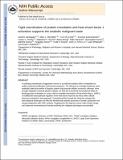Tight Coordination of Protein Translation and Heat Shock Factor 1 Activation Supports the Anabolic Malignant State
Author(s)
Santagata, S.; Mendillo, Marc L.; Subramanian, A.; Perley, C. C.; Roche, S. P.; Wong, B.; Narayan, Rajiv; Kwon, H.; Golub, Todd R.; Porco, J. A.; Whitesell, L.; Lindquist, Susan; Tang, Yun-Chi; Koeva, Martina I; Amon, Angelika B; ... Show more Show less
DownloadAmon_Tight coordination.pdf (3.624Mb)
OPEN_ACCESS_POLICY
Open Access Policy
Creative Commons Attribution-Noncommercial-Share Alike
Alternative title
Tight Coordination of Protein Translation and HSF1 Activation Supports the Anabolic Malignant State
Terms of use
Metadata
Show full item recordAbstract
The ribosome is centrally situated to sense metabolic states, but whether its activity, in turn, coherently rewires transcriptional responses is unknown. Here, through integrated chemical-genetic analyses, we found that a dominant transcriptional effect of blocking protein translation in cancer cells was inactivation of heat shock factor 1 (HSF1), a multifaceted transcriptional regulator of the heat-shock response and many other cellular processes essential for anabolic metabolism, cellular proliferation, and tumorigenesis. These analyses linked translational flux to the regulation of HSF1 transcriptional activity and to the modulation of energy metabolism. Targeting this link with translation initiation inhibitors such as rocaglates deprived cancer cells of their energy and chaperone armamentarium and selectively impaired the proliferation of both malignant and premalignant cells with early-stage oncogenic lesions.
Date issued
2013-07Department
Massachusetts Institute of Technology. Department of Biological Engineering; Massachusetts Institute of Technology. Department of Biology; Koch Institute for Integrative Cancer Research at MITJournal
Science
Publisher
American Association for the Advancement of Science (AAAS)
Citation
Santagata, S., M. L. Mendillo, Y.-c. Tang, A. Subramanian, C. C. Perley, S. P. Roche, B. Wong, et al. “Tight Coordination of Protein Translation and HSF1 Activation Supports the Anabolic Malignant State.” Science 341, no. 6143 (July 18, 2013): 1238303–1238303.
Version: Author's final manuscript
ISSN
0036-8075
1095-9203